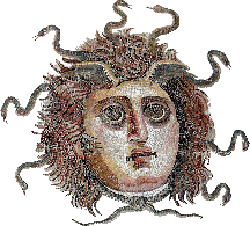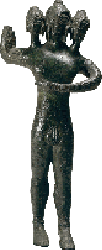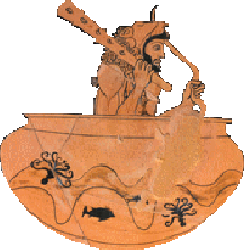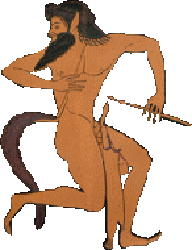GREEK ADVENTURERS: ISLANDS OF THE BLESSED AND CURSED
THE FORTUNATE ISLES AND ELYSIUM

The Odyssey has the sea god Proteus tell Menelaus that he is bound for the Elysian Fields, ruled over by Rhadamanthys, at the ends of the earth, which is constantly blessed by west winds. Hesiod's Works and Days extends this happy fate to all of the generation of heroes. Homer, meanwhile, gives something of a road-map to the land of the dead in his description of the souls of the suitors of Penelope, slain by the returning Odysseus [Odyssey 24.12 ff.]: -
The White Rock in that description is particularly interesting, as Arctinus of Miletus' Aethiopis has Achilles being transported to the White Island by his mother Thetis. This White Island is later placed at the mouth of the Danube, but the earlier conception surely placed it at the extremities of the earth, given its proximity to the Gates of the Sun. Also, Hellanicus of Lesbos mentions that Poseidon had a son by Celaeno, a daughter of Atlas, named Lycus, whom he settled in the Isles of the Blest. In the same century, Pindar (who also has a subterranean Elysium where the sun shines during our night time) in his 2nd Olympian Ode [68-77] makes mention of the way to these islands: -
Pliny the Elder, in one instance, places the Fortunate Isles off the north-western coast of Iberia, noting that they are also termed Islands of the Gods [4.36], while he echoes what had come to be the standard identification of the Isles of the Blest with the Canary Islands in another [6.37]: -
GORGONS IN THE WEST

Another hero who travelled into the ocean was Perseus, who fought the Gorgon Medusa. Hesiod [Theogony 270 ff.] places the Gorgons in the far west: -
The Cypria, another component of the Epic Cycle, names the Gorgons' island home as Sarpedon, and Stesichorus also knows of a "Sarpedonian" island in the ocean. It was in the work of this poet that the exploits of Perseus' great-grandson came to be located in the area of Iberia.
HERACLES ON ERYTHEIA AND MENESTHEUS NEAR GADES


It was Stesichorus who, to the best of our knowledge, established the "real world" location of the fabulous island of Erytheia in the region of Tartessos and Gades. There dwelt the monstrous Geryon, Heracles' opponent, and the son of Chrysaor (mentioned above) and Oceanus' daughter Callirhoe. Nearby, significantly perhaps, was an oracle dedicated to a slightly later hero, a contemporary of Odysseus who fought alongside him at Troy: Menestheus. This man was the king of Athens during that campaign, having succeeded the renowned Theseus.
The area of Tartessos was also associated with primordial struggles between divine powers: the late source Thallus - best known perhaps for his history of the Samaritans - has a confused set of alliances, pitting Ogyges (or Gyges) of Attica (he is more commonly associated with Boeotia) alongside Belus and Saturn (Cronus) against Jupiter (Zeus), resulting in his flight to Tartessus. The name cannot but remind us of Calypso's Ogygia, but may also be associated with Gyes or Gyges, one of the brothers of Briareus.
Similar is the tale of Ophion - the serpentine predecessor of Cronus who was defeated and banished beneath Ogenus (i.e. Oceanus). Otherwise, he was punished by Zeus by having the mountain Ophionion placed upon him, which reminds us of the Ophioussa of the Phocaean explorers. Ophion's wife was Eurynome, otherwise the name of an Oceanid who, along with Achilles' mother Thetis (a creation goddess, perhaps, according to Alcman), gave refuge and succour to Hephaestus beneath the ocean after he was expelled by his mother Hera from Olympus. Eurynome's male counterpart Eurynomus appears as a demon of the underworld in painting.
Anyway, back to Erytheia - whose name is shared with one of the Hesperides according to Hesiod. Geryon was warned of Heracles' presence on the island by a certain Menoetes, a cowherd in the service of Hades, who pastured the infernal deity's kine on the island. Heracles would lock horns with this Menoetes again during a subsequent labour, when Heracles was tasked with bringing back none other than the fearsome Cerberus from Hades. Whilst in the underworld, he attempts to slay some of Hades' cattle to feed the spirits, whereupon Menoetes son of Ceuthonymus challenges him to a wrestling match. Thanks to Persephone's calling off Heracles, Menoetes gets away with only a few broken ribs. Hesiod tells the story of the similarly named Menoetius, a brother of Atlas, who is struck by Zeus' thunderbolt due to being "outrageous" and full of "mad presumption and exceeding pride." This reminds us of the likes of Eurymedon, ruler of the Gigantes, and ancestor of Homer's Phaeacians.
Another giant who got his comeuppance for his misdeeds was killed by Heracles during the Gigantomachy, having attempted to purloin the cattle of Helios from Erytheia (they were in Thrinacia in the Odyssey). In order to do so, the hero was summoned from the future, after the gods realised that they would be bested if they did not acquire the assistance of this greatest of heroes.
AN ATLANTIC ISLAND IN "ARISTOTLE" AND ELSEWHERE
Another, unnamed, island, which bears more similarities with Atlantis than to any of the islands known today, appears in a work attributed to Plato's one-time follower Aristotle [De Mirabilibus Auscultationibus 84]: -
A more elaborate account of this mysterious land is that of Diodorus Siculus [5.19.1-20.4], where the history of interactions is given in an expanded version. The first people to have come across the island are the Phoenicians [5.20.1-3]: -
This brought the island to the attention of the Etruscans ("Tyrrhenians"), whose colonial designs in that sphere meet with Carthaginian opposition [5.20.4]: -
Plainly, though, this is not Atlantis, and despite including accounts of such legendary places as Panchaea [5.41.4-46.7] and the Islands of the Sun [2.55.1-60.3], Diororus (at least in the portions of his text which have survived until now) appears to make no mention of Atlantis in connection with this account or elsewhere. This account appears between those of the Balearic Islands and Britain, thus leaving no plausible room for Atlantis. The island does however share a number of features with Plato's texts. In particular, the fecundity of the island and references to its watercourses and mountains cannot fail to bring to mind Plato's description of his own Atlantic island.
In terms of the origin of these tales, pseudo-Aristotle suggests a Carthaginian origin for the account, which is perhaps connected to possible evidence of Carthaginian activity in Macaronesia: for example, Nuno Ribeiro, Anabela Joaquinito and Sérgio Pereira survey material evidence suggesting ancient visitors to Terceira in the Azores, where a number of hypogaea have recently been found. More controversially, a "Carthaginian" statue was discovered on the furthest of the Azores, Corvo, in the 16th century by the earliest Portuguese settlers. It was described by the chronicler Damião de Góis as "a stone statue standing on a slab, representing a man on top of a bone horse, and the man dressed in a rain cape, without hat, with one hand on the horse's mane, and the right arm stretched out, with all the fingers clutched except the second finger, known in Latin as the index, pointed towards the west." A hoard of Carthaginian and Cyrenaican coins dating from the latter part of the 4th century BC (i.e. in the decades after Plato's demise) was also allegedly found on Corvo in 1749.
Diodorus suggests that the Carthaginians had competition over the island from the Etruscans, though this detail may derive from a misunderstanding of Herodotus' account of the Phocaeans in the western Mediterranean [1.165-167], wherein Cyrnus is usually identified with Corsica. It is proposed that the name Cyrnus came to be confused with that of Cerne, derived from Carthaginian sources, where it is one of the furthest known points on the western side of Africa.
Thus, Carthaginian sailors' tales of an island outside the Pillars of Heracles may well be a source for Plato's Atlantis, though this is problematic: the island doesn't feature in the accounts of Hanno or Himilco and the two Greek accounts of the island postdate Plato. In addition, Plato already had a number of conceptual islands to hand from Greek mythology. Nonetheless, from the patchwork of evidence considered above, it could certainly be possible that Plato was familiar with Carthaginian-derived descriptions of an island or islands in the Atlantic Ocean.
SERTORIUS: ONCE AGAIN TO THE ISLANDS OF THE BLEST
The identity of this island can perhaps be found in a reference from Plutarch's Life of Sertorius [8.2-3]: -
The scene is a Libyan one: shortly afterwards, Sertorius excavates the remains of Antaeus at or near Tingis, disovering the body to be sixty cubits long!
OTHER ISLANDS
Another set of islands located in this region are the Gorgades, mentioned by Pliny, off the coast of Africa. These "were formerly the habitation of the Gorgones" and lie two days' sail from Africa. Pliny [6.200] adds that Hanno visited there, encountering a group of hirsute females, called the gorillae in Hanno's Periplus. He also adds that: -
Perhaps identifiable with the Gorgades and their hairy inhabitants is another island mentioned by Pausanias [1.23.6]. This account is prefaced by a marine undertaken affected by storms and blown drastically off course (a common means to access the "otherworld"), whereupon Euphemus the Carian reported: -

Clearly, then, not all inhabitants of Atlantic islands were friendly and blessed by the gods.
